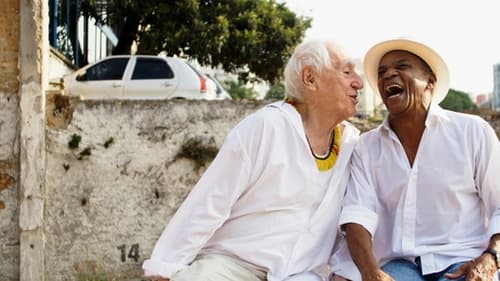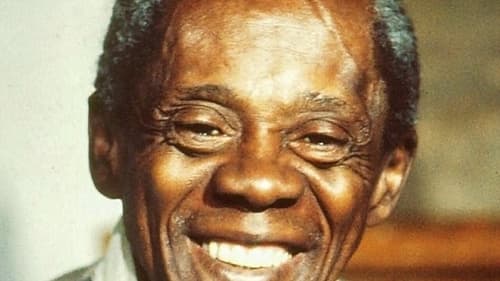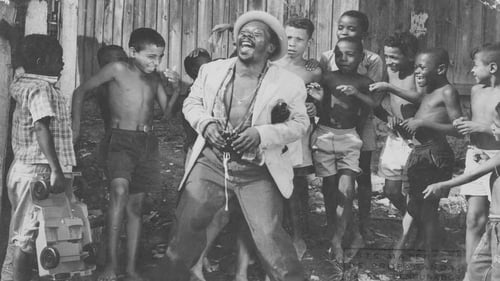Ruth de Souza
Nacimiento : 1921-05-12, Rio de Janeiro, Rio de Janeiro, Brazil
Muerte : 2019-07-28

Josephina / Matilda / Madre Amélia
Moments before a father's death, all of his family memories are transferred to his son through a dream, from the first ancestor, an Englishman living at the end of the 18th century, to his Brazilian heirs, the protagonists of this story.

Self (archive footage)
Con escenas de su concierto en el Theatro Municipal de São Paulo, el rapero y activista Emicida celebra el gran legado de la cultura afro en Brasil.

herself
Stories of black women who, thanks to the relentless toil of their mothers, were able to attend school and retrace the paths treaded by their ancestors. Their memories, joys and sorrows become present as a possibility for a new fate, transforming the hard work of the washerwomen in a spectacle of life and fulfillment.

What does Brazilian cinema tell us? What does Brazilian cinema tell us about black actresses and actors? ‘Pressed, Ripped Apart’ makes use of archival sources to retrieve the trajectory of black actresses and actors who, between absences and delimited presences, between the fallacy of a racial democracy – based on the harmony among Brazil’s diverse identities – and erasure of identity, strain the history of Brazilian audiovisual and above all, our own history.


Self
This documentary investigates the aesthetic, political and existential trajectory of emblematic Black Brazilian actor Antônio Pitanga. He career spans over five decades, and he has worked with iconic Brazilian filmmakers Glauber Rocha, Cacá Diegues and Walter Lima Jr. He was a prominent figurehead and outspoken activist during the Brazilian dictatorship, a period of unrest in Brazilian cinema. Pitanga deep dives into the world of Antônio and the history of Brazil. The documentary was directed by his daughter Camila Pitanga, one of widely recognised faces in Brazilian television and cinema right now. The film is also a poem, and a tender ode to fatherhood.

Dona Célia
Vicente, que mantiene la firme convicción de que el pasado es todo aquello que recuerdas, imaginas que recuerdas y finges recordar, trabaja creando nuevos pasados por encargo por medio de documentos, fotos y vídeos. Su vida da un giro cuando una hermosa y misteriosa mujer aparece en su despacho para pedirle un nuevo pasado para ella sin facilitarle ningún dato de su vida personal y dándole como condición única que en ese pasado haya cometido un crimen. Un difícil desafío para Vicente, que nunca ha amado a nadie y que decide inventar a Clara, una mujer de la que podría enamorarse.

Cida
É uma lírica história de redenção amorosa entre irmãs, mães e filhas, em uma pequena cidade do interior de Minas Gerais, onde os fantasmas da escravidão e do racismo acentuam os dramas de forma sutil e poderosa.

Carolina de Jesus
Three black teenagers walk around town. The two boys laugh at their own racist jokes while the girl watches them in silence.

Herself
A documentary film about the taboos, stereotypes, and struggles of black actors in Brazilian television "soaps". Based on his own memories and on a sturdy body of research evidence, the director analyses race relations in Brazilian soap operas, calling attention to their likely influence on Brazilian African-Americans' identity-forming processes.

Joana

Mariana
The torrid love affair between a 40-year-old man who lives isolated from the world, in his small farm nearby São Paulo and a politically engaged 30-year-old journalist. One morning, after a night of wild lovemaking, he notices a hole made by sauba ants in his fence. This simple fact raises accusations and discord between the two lovers.

Mrs. Esteban
A photo-journalist goes to Brazil to investigate a savage crime boss. She becomes infatuated with the story.

Prepared by the team of the Program for Training Black Researchers, The video brings together images and voices that talk about the reproductive health of black women, diseases taking into account the racial/ethnic background, habits, customs, the physical and social environment and the inhuman conditions imposed by racism.

Old Woman Kissing
Adaptación de la novela "El gran arte", de Rubem Fonseca.

Mama Santa
Four buddies set out on a three-week deep-sea fishing holiday in the Amazon and run into trouble.

Interviews and performances with black women on film, theater and television who narrate their lives, careers, discrimination and struggles in the Brazilian artistic world. Starring actresses Zezé Motta, Ruth de Souza, Léa Garcia, Zenaide Zen and Adele Fátima, as well as activist Lélia Gonzáles.

Tia Luiza
Jubiabá is a French-Brazilian film based on the homonymous novel by Jorge Amado. The film tells the story of the interracial love between the daughter of a rich Commander and Antonio Balduíno, a rascal, fighter and famous lover from Salvador.

Rainha Louca
After assaulting a Hollywood film crew, a group of residents of a community in Rio de Janeiro decided to produce a film that would express the reality of Brazil - with the theme of Inconfidência Mineira.

A young woman, victim of violence, takes refuge with an old sailor.

Baby is found by nuns, who raise her inside the convent. When she grows up, she moves to a fishing village and gives up religious life when she falls in love with a black fisherman, who practices a Afro-Brazilian religion called Umbanda.

A man gets locked naked outside of his apartment.

Based on the novel by Franklin Távora, the film follows the adventures of a father and a son in 18th century Brazil.

Judith
Based on true events in Rio de Janeiro, in 1960, when a gang having the infamous outlaw Tião Medonho as a leader performed a sensational railroad hold-up on a train carrying a small fortune.

Luisa

Praying Woman
A man's farm is attacked and his mother gets killed. Looking for revenge, he goes about chasing the men who killed her.

Mama Rata-loi
A writer who specializes in exposing fake witchcraft journeys to Brazil to investigate a voodoo cult.

A girl goes from a favela to the luxurious scenarios of the international singing industry

A woman, who believes she has a curse, sees an engineer die in an accident while building a bridge. Considering two men who were courting her responsible for the tragedy, she decides to take revenge on both. Brazilian version of Brontë's Wuthering Heights.

A small town is taken upside down when an inventor finds a way to turn bones into gold.

Shirley
Anabela, una bella y talentosa bailarina, aparece muerta flotando en un lago. La policía rápidamente asume el caso como un asesinato, pero cuando los residentes de la pensión donde también vivía Anabela comienzan a ser entrevistados, la policía se da cuenta de que todos tenían al menos una razón para matar a la chica, lo que complica la investigación del caso.

Manuela
Candinho is a hillbilly who leaves the countryside, taking his donkey along, and goes to São Paulo, trying to find his mother.

In 19th century Brazil, young people in the State of São Paulo fight against black slavery and the farmers who support it. Against this backdrop, Sinhá Moça falls in love with a young lawyer, and they get involved in a great love story.

The administrator of an abandoned coffee farm and inveterate gambler saves money to buy the property, even knowing of the loving connections between his wife and the boss.

A woman marries a gambler, thinking she could straighten him up, but he loses all their assets, even their own house, and tries to commit suicide. But one of the winners falls for his stepdaughter, and this could change the situation.

A drama about double personality

Rosália
Renato and Miro are black brothers raised by a white family in an old mansion in Rio de Janeiro. Renato, a graduated lawyer, has always looked for dignity, winning in life due to his honesty and search for social recognition. His brother, on the contrary, is a rebel small time crook who believes his behavior is the product of the treatment he received while being rased by the whites.

Empregada



























